#anti israel slogans
Explore tagged Tumblr posts
Text

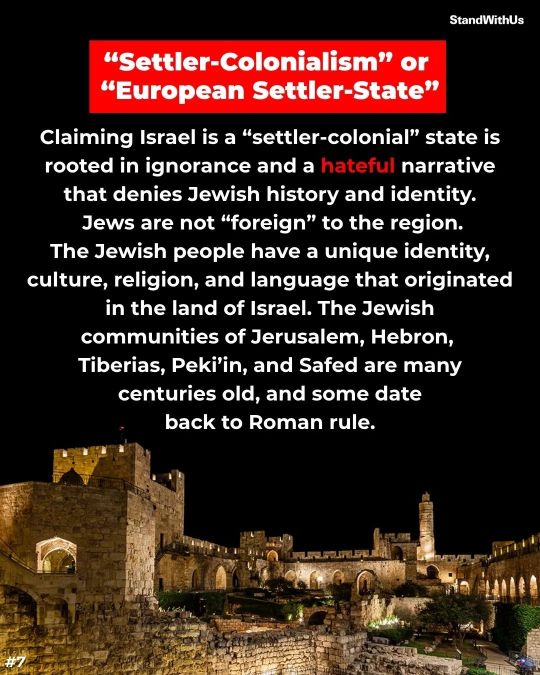

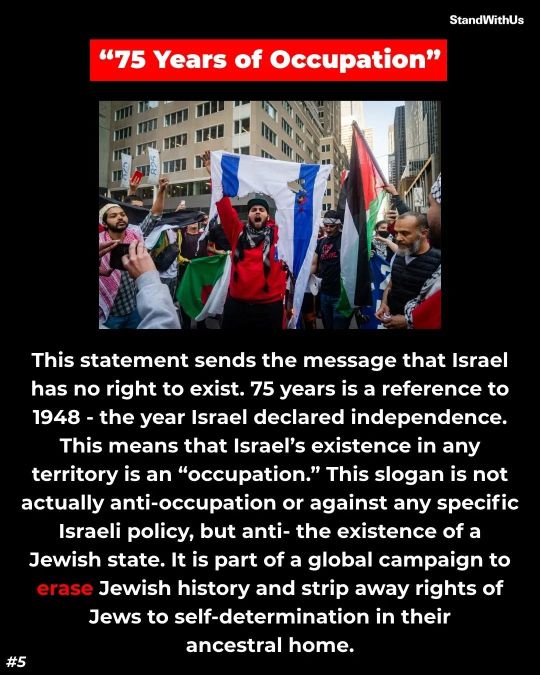




#stop the hate#anti semitism#israel#gaza#palestine#hamas are terrorists#hamas are not freedom fighters#hamas are cowards#stand with israel#bringthemhomenow#hamas is isis#israel has a right to exist#anti israel slogans
45 notes
·
View notes
Text
Can we please stop calling these protestors "anti-war"? If you're yelling "glory to our martyrs," "burn Tel Aviv to the ground," or "Hamas make us proud, kill another soldier now" you're pro-war. You want a change in power through violence.
#there are real pro-peace/anti-war activists out there#but they aren't the people smashing windows and screaming about how palestine will be arab#I think most of these Americans really don't want the war to end though#they're enjoying themselves#and patting themselves on the back b/c they've found a good scapegoat for their inherited national guilt#feels good to have an currently fashionable political slogan about rivers and seas that makes you feel aligned with the oppressed#and fyi I feel the same way about war-mongering on the pro-Israel pro-war side#the difference is I'm willing to say that#are you?#israel palestine conflict
5 notes
·
View notes
Text
How large parts of Israeli society have come to justify war crimes
youtube
UNAPOLOGETIC
Anat Matar is an Israeli academic and philosopher who is leading an open call from Israelis to have sanctions imposed on their own country.
Since Israel’s genocide in Gaza began after the events of 7 October, Matar and a few other Israelis have seen the social space around them get narrower and narrower, as mainstream Israeli society, educators, media institutions and leaders have stood behind Israel’s war.
As we reflect in our conversation, some parts of Israeli society may differ on the tactics being used, but the vast majority stand behind the army's actions on the whole and defend or deny their country’s obvious and very visible atrocities.
This episode was recorded on 11 November 2024.
Timestamps: 00:00 Intro 05:25 Macabe Tel Aviv slogans and Israeli media 08:30 How Israeli society justifies war crimes 11:30 What are anti-government protests in Israel all about? 16:20 The open letter to sanction Israel 20:20 What was the societal discourse like 18 months ago 24:00 Academic and social media freedoms in Israel 33:00 Situation for Palestinians who are Israeli citizens 37:40 What has happened to the media in Israel - Haaretz 41:51 Is Israel safe for you? 45:00 Anat’s early life and childhood 48:00 Oslo accords’ shortcomings and settlers 53:45 Endgame for Gantz, Lieberman and Lapid 58:30 Israel’s expansionist nature
#Youtube#Middle East Eye#Anat Matar#justifying war crimes#Anat Matar academic#Anat Matar philosopher#Israelis calling for sanctions against Israel#Israeli genocide in Gaza#Gaza#Gaza Strip#Gaza genocide#Israel#Israeli genocide#Israel Jewish state#Jewish genocide of Palestinians#7 October#Israeli atrocities#Macabe Tel Aviv slogans#Israeli media#Haaretz#anti-government protests#open letter to sanction Israel#social media freedoms in Israel#Academic freedoms in Israel#psychosis in Israeli societies#Oslo accords#Gantz#Lieberman#Lapid#Israel’s expansionist nature
0 notes
Text
if any of you guys are wondering if the rnc is as disturbing as you imagine…..yes, and then some!
#my step dad is watching it and i can hear it from the other room#when i was in the kitchen so couldn’t help but see the tv screen; they had a bunch of white boys with mullets walking down a red carpet high#fiving ppl and the chyron literally said UNC FRAT BOYS and in smaller text SAVED THE AMERICAN FLAG FROM ANTI ISRAEL PROTESTORS and it’s so#surreal. like my human brain cannot process these images alongside the images of the reality in gaza rn. you just can’t do it#on a lighter note they have a live slug reaction shot of trump once in a while and it’s funny to me bc it makes me think of the live slug re#action meme’s origin as live tucker reaction.#anyways yeah i’m wearing headphones too now so i can’t hear any of it and don’t plan on venturing back out into the kitchen but yeah.#OH ALSO APPARENTLY THE NEW SLOGAN IS MAKE AMERICA STRONG AGAIN WHICH I HADNT HEARD BEFORE NOW. LIKE DID ANYBODY KNOW THAT.#ugh i’m tired
1 note
·
View note
Text


grafiti on a memorial in germany built in honor of non jewish women who protested against the persecution of their jewish family members, primarily their husbands, during the holocaust (german) (english)
The same night as the vandalism, an anti-Israel protest was held in the same borough, according to the Berlin Police. Law enforcement attempted to disperse the unauthorized protest at the Berlin Central Station but reportedly responded with by chanting anti-police and anti-Israel slogans. (X)
1K notes
·
View notes
Text
AMAZING article about what it means to participate in anti-Zionism work both online and in person.
If your anti-zionism does not in any way acknowledge that it is a way of thought and practice led by and for Palestinians, then you need to reevaluate your "anti-zionism" label.
Some passages that felt especially relevant to tumblr:
If we accept, as those with even the most rudimentary understanding of history do, that zionism is an ongoing process of settler-colonialism, then the undoing of zionism requires anti-zionism, which should be understood as a process of decolonisation. Anti-zionism as a decolonial ideology then becomes rightly situated as an indigenous liberation movement. The resulting implication is two-fold. First, decolonial organising requires that we extract ourselves from the limitations of existing structures of power and knowledge and imagine a new, just world. Second, this understanding clarifies that the caretakers of anti-zionist thought are indigenous communities resisting colonial erasure, and it is from this analysis that the strategies, modes, and goals of decolonial praxis should flow. In simpler terms: Palestinians committed to decolonisation, not Western-based NGOs, are the primary authors of anti-zionist thought. We write this as a Palestinian and a Palestinian-American who live and work in Palestine, and have seen the impact of so-called ‘Western values’ and how the centring of the ‘human rights’ paradigm disrupts real decolonial efforts in Palestine and abroad. This is carried out in favour of maintaining the status quo and gaining proximity to power, using our slogans emptied of Palestinian historical analysis.
Anti-zionist organising is not a new notion, but until now the use of the term in organising circles has been mired with misunderstandings, vague definitions, or minimised outright. Some have incorrectly described anti-zionism as amounting to activities or thought limited to critiques of the present Israeli government – this is a dangerous misrepresentation. Understanding anti-zionism as decolonisation requires the articulation of a political movement with material, articulated goals: the restitution of ancestral territories and upholding the inviolable principle of indigenous repatriation and through the right of return, coupled with the deconstruction of zionist structures and the reconstitution of governing frameworks that are conceived, directed, and implemented by Palestinians. Anti-zionism illuminates the necessity to return power to the indigenous community and the need for frameworks of justice and accountability for the settler communities that have waged a bloody, unrelenting hundred-year war on the people of Palestine. It means that anti-zionism is much more than a slogan.
[...]
While our collective imaginations have not fully articulated what a liberated and decolonised Palestine looks like, the rough contours have been laid out repeatedly. Ask any Palestinian refugee displaced from Haifa, the lands of Sheikh Muwannis, or Deir Yassin – they will tell that a decolonised Palestine is, at a minimum, the right of Palestinians’ return to an autonomous political unit from the river to the sea. When self-proclaimed ‘anti-zionists’ use rhetoric like ‘Israel-Palestine’ – or worse, ‘Palestine-Israel’ – we wonder: where do you think ‘Israel’ exists? On which land does it lay, if not Palestine? This is nothing more than an attempt to legitimise a colonial state; the name you are looking for is Palestine – no hyphen required. At a minimum, anti-zionist formations should cut out language that forces upon Palestinians and non-Palestinian allies the violence of colonial theft.
[...]
The common choice to centre the Oslo Accords, international humanitarian law, and the human rights paradigm over socio-historical Palestinian realities not only limits our analysis and political interventions; it restricts our imagination of what kind of future Palestinians deserve, sidelining questions of decolonization to convince us that it is the new, bad settlers in the West Bank who are the source of violence. Legitimate settlers, who reside within the bounds of Palestinian geographies stolen in 1948 like Tel Aviv and West Jerusalem, are different within this narrative. Like Breaking the Silence, they can be enlightened by learning the error of colonial violence carried out in service of the bad settlers. They can supposedly even be our solidarity partners – all without having to sacrifice a crumb of colonial privilege or denounce pre-1967 zionist violence in any of its cruel manifestations. As a result of this course of thought, solidarity organisations often showcase particular Israelis – those who renounce state violence in service of the bad settlers and their ongoing colonisation of the West Bank – in roles as professionals and peacemakers, positioning them on an equal intellectual, moral, or class footing with Palestinians. There is no recognition of the inherent imbalance of power between these Israelis and the Palestinians they purport to be in solidarity with – stripping away their settler status. The settler is taken out of the historical-political context which afforded them privileged status on stolen land, and is given the power to delineate the Palestinian experience. This is part of the historical occlusion of the zionist narrative, overlooking the context of settler-colonialism to read the settler as an individual, and omitting their class status as a settler.
It is essential to note that Palestinians have never rejected Jewish indigeneity in Palestine. However, the liberation movement has differentiated between zionist settlers and Jewish natives. Palestinians have established a clear and rational framework for this distinction, like in the Thawabet, the National Charter of Palestine from 1968. Article 6 states, ‘The Jews who had normally resided in Palestine until the beginning of the Zionist invasion will be considered Palestinians.’ When individuals misread ‘decolonisation’ as ‘the mass killing or expulsion of Jews,’ it is often a reflection of their own entanglement in colonialism or a result of zionist propaganda. Perpetuating this rhetoric is a deliberate misinterpretation of Palestinian thought, which has maintained this position over a century of indigenous organising. Even after 100 years of enduring ethnic cleansing, whole communities bombed and entire family lines erased, Palestinians have never, as a collective, called for the mass killing of Jews or Israelis. Anti-zionism cannot shy away from employing the historical-political definitions of ‘settler’ and ‘indigenous’ in their discourse to confront ahistorical readings of Palestinian decolonial thought and zionist propaganda.
[...]
In the context of the United States, the most threatening zionist institutions are the entrenched political parties which function to maintain the status quo of the American empire, not Hillel groups on university campuses or even Christian zionist churches. While the Anti-Defamation League (ADL) and the American Israel Public Affairs Committee (AIPAC) engage in forms of violence that suppress Palestinian liberation and must not be minimised, it is crucial to recognise that the most consequential institutions in the context of settler-colonialism are not exclusively Jewish in their orientation or representation: the Republican and Democratic Party in the United States do arguably more to manufacture public consent for the slaughtering of Palestinians than the ADL and AIPAC combined. Even the Progressive Caucus and the majority of ‘The Squad’ are guilty of this.
Leila Shomali and Lara Kilani
2K notes
·
View notes
Text

A reminder that Anti-Israel doesn’t mean “Pro-Palestinian”.
The militant faction referenced here is Ansar Allah (aka The Houthi Movement, commonly known as just “the Houthis”), a totalitarian theocracy that does not mince words about hating not just Israel, but the Jewish people. Their slogan, which they display as the symbol for their movement, is “God is the Greatest; Death to America; Death to Israel; A Curse On the Jews; Victory to Islam”.
Also no, the Houthis didn’t risk jack shit for Palestine. They’re one in a long line of militant factions who are directly responsible for the humanitarian crisis in Yemen. Abandoning their own people’s humanitarian needs to wage war isn’t a “risk” for them; it’s standard operating procedure.
The people obscuring this fact to position them as heroes for opposing Israel are engaging in dishonest, manipulative, and immensely antisemitic propaganda. (Also, like, “puppets”? Really? That’s not even subtle.) You do not even have to scratch beyond the surface of just “who is this referencing, and what is their slogan that they plaster everywhere on everything?” to know this. The fact that anyone would fall for it demonstrates gross negligence & a deep & unserious lack of curiosity on their part. There’s no excuse.
But what if you did actually spend more than 5 seconds to know more than 2 facts about the government of Yemen? Well, you might find:
There is a long history of antisemitic violence in Yemen. It culminated in 1949, and roughly 47,000 of Yemen’s 50,000+ Jews fled to Israel. A few remained, but the Houthi regime (which formed in the 90’s and is the one that is now attacking Israeli ships) is so openly, explicitly, & genocidally antisemitic that it forced even that remnant to flee.
The last Jew in Yemen, Levi Salem Musa Murhabi, is currently rotting in a Houthi prison where he has been illegally detained & tortured for the last 7+ years. Our last sign of life was in 2022, so we don’t actually know if he’s still alive.
The country that tried to murder all their Jews & continues to torture the only one that remains is now attacking the country where all those Jews went, all the while chanting “death to Israel, a curse on the Jews.” Do the math. They didn’t “show up” for Palestinians. They pulled up on Israel because that’s where all the Jews they’ve been trying to murder for years live.
2K notes
·
View notes
Text
A friend asked what they can do to fight antisemitism, from the perspective of wanting to free Palestine and thinking that is a more pressing issue. My response was, I feel, good enough to repost here. Please read it:
"I think the main thing here is that these are not exclusive issues. Netanyahu wants more Jews to move to Israel for similar reasons; so he benefits from Jews feeling unsafe worldwide. Any feasible pro Palestine activism requires active and intentional anti-antisemitism
I also want to point out that Americans who do not have native ancestry or weren't brought here by force are settler colonialists, with much less of a claim to the land than any Jew has to the levant, and the genocide of native Americans is ongoing. Americans have more of a responsibility to land back at home, no matter how pressing the situation across the ocean is.
Another thing is that many countries are at fault for the plight of Palestinians, not just the USA and Israel, though that’s the dominant narrative. Many neighboring countries refuse to allow refugees or provide real help. Egypt especially deserves to be criticized.
Finally, and this is the hard part: our society (western) was built on a foundation of antisemitism. It goes back to ancient Egypt and Ancient Greece. This hatred is the dna that runs through Christianity and Islam because it is how they defined themselves and every country that is a majority people from those religions. Colonialism itself is a direct descendant of supercessionism from both religions, and racism directly grew out of the racial laws of Spain that came from the inquisition and the antisemitism that caused it. If you want to fix anything - including the situation in Palestine - you need to pay attention to antisemitism and fix it and work on it. The pro Palestine movements primary problem is its antisemitism - many slogans have either the direct or indirect meaning of “kill all Jews”, and serve as dogwhistles. And this goes beyond even that - the current waves of transphobia are intimately tied with antisemitism. The hatred that defines so much of our society was born of antisemitism.
If you want to fix anything, at all, you need to get at this root and pull it up. It’s hard, but it’s necessary. There’s a reason progressive movements keep falling short or outright failing, and it’s from ignoring the centrality of antisemitism."
And that's why you should care, even if it never seems particularly pressing. Which, for the record, it is pressing - if you can't tell, it's because you aren't Jewish.
380 notes
·
View notes
Text
Yassin al-Haj Saleh, "The Liquid Imperialism That Engulfed Syria," Commons, December 18, 2023:
Syria is a country of only 71,498 square miles in area, with a population of less than 24 million, and yet two global superpowers (the United States and the Russian Federation) and three of the largest regional powers (Iran, Turkey and Israel) are present on its territory. Israel has occupied the Syrian Golan Heights since 1967, and carries out almost nonstop incursions into Syrian air space today. In centuries past, prior to the heyday of European and Russian imperialism, Iran and Turkey were empires. While it is debatable whether they still qualify as imperial powers, they have never let go of their regional imperial ambitions. One way to understand them, regionally, is as “subimperial”: expansionist and interventionist, including militarily, in neighboring countries.
The U.S. and Russia have well-known histories of expansion and domination of peoples and territories. Imperialism was key to the very formation of both nations. But while Russia’s “manifest destiny” had been, for centuries, to expand into neighboring areas in Central Asia and Eastern Europe, it was in Syria that Moscow established its first overseas outpost. I will return to this crucial fact later.
In Syria, multiple imperial and subimperial powers have poured into one small country — some of them to protect a murderous regime, all of them annihilating any independent political aspirations among its people, dividing up sectors of Syrian society among themselves and their satellites, and denying Syrians the promise of a different future.
This unique situation was made possible by a combination of internal as well as international structures and dynamics involving five key powers — the U.S., Russia, Iran, Turkey and Israel...
One slogan of the recent protests that erupted in the southern city of Sweida on Aug. 20, 2023, speaks directly to the imperial-colonial complex that controls Syria:
["]We want the seaport, we want the land (the oil, in another formula) and we want the airport returned to us!["]
The seaport is Tartus, which, as mentioned, has been leased to Russia. The land is divided by the five occupying powers. And Damascus International Airport has, for several years now, been widely perceived to be under de facto Iranian control. The protestors in Sweida are thus drawing a connection between their economic hardships and the colonial relations between the regime and its Russian and Iranian protectors. In the version of the slogan that refers to oil, the implication is that it has been usurped by another imperial power: the U.S...
Lenin’s argument that imperialism represents “the highest stage of capitalism” has led many to think of imperialism as embodied in a very few capitalist powers. By this logic, there has been only one imperialism since World War II: Western imperialism, with the U.S. as its center and NATO as its military arm. The Soviet Union was not generally seen by those on the left as imperialist: not following World War II, nor after it invaded Hungary in 1956 and Czechoslovakia in 1968, nor even after it invaded Afghanistan in 1979. Similarly, Putin’s Russia has not generally been understood as imperialist, even after the annexation of Crimea in 2014 and the intervention in Syria in 2015. For much of the so-called anti-imperialist left, not even the full-scale invasion of Ukraine in February 2022 was enough.
This conception of imperialism must be challenged. The case of Syria requires a paradigm shift in the understanding of imperialism and the theorizing of new practices and phenomena pertaining to it.
Ultranationalism, expansion, dismissal of international law, exceptionalism, imperial imaginaries — these are characteristics of many powers in the age of the war on terror. With “terror” identified as the principal political evil globally, any state that joins in this alleged war can gain international legitimacy — even those engaged in war crimes and murder on an industrial scale. This has dealt massive blows to the rule of law both locally and internationally. It has contributed to a securitized politics, it has promoted thuggery among political elites and has weakened democracy and popular movements everywhere. Imperialism has permeated the practices of power in many countries, among which Syria is arguably the most unfortunate, with no fewer than five expansionist powers on its territory.
The concept of liquid imperialism is an attempt to capture the fact that five different powers have penetrated one small country. But it also speaks to the lack of solidity or coherence in these powers’ strategies, practices, visions and commitments. Unlike the imperial projects of the past, in Syria there is no “civilizing mission.” Natural resources are not a primary motive (though the intervening states have seized whatever they can get their hands on, from oil and phosphates to seaports and airports, to water and real estate). Rather, this is a scramble to control the future of the country.
There is also a liquid aspect in the relations among the five colonial powers. In Syria, we have two Russias — one of them is called the U.S. On a rhetorical level (especially at the beginning of the uprising), Moscow and Washington seemed to be on opposite sides: The Kremlin stood by Assad and the White House denounced him. Yet operationally, Russia and the U.S. were effectively on the same side — especially after the Islamic State came into the picture and became the central focus of U.S. strategy in Syria. From that point forward, Moscow and Washington were on the same page: The two powers closely coordinated “deconfliction” and their military personnel were on the phone to each other on a daily basis to avoid planes flying in the same location at the same altitude and to ensure airstrikes didn’t hit one another’s “friendlies.” For all the bluster about Washington wanting “regime change” in Syria, the exact opposite was the case. The researcher Michael Karadjis has demonstrated that U.S. policy in Syria was decidedly one of “regime preservation.”
189 notes
·
View notes
Text
Don't let polish authorities protect Netanyahu
Quick context:
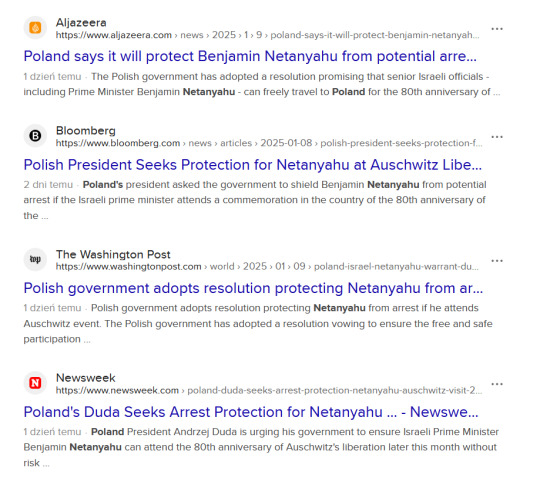
a petition you can sign to let them know you object:
Petition text in English:
Poland, December 2024
Open letter: an appeal for equal standards in the application of international law, addressed to the Prime Minister, the Council of Ministers of the Republic of Poland, the Minister of Foreign Affairs and the Minister of Justice
We, for whom the memory of the Holocaust is an ethical challenge, contained in the slogan "never again - for anyone, anywhere", we, who for a year have been watching with horror the massacre committed by Israel on Palestinian women and men in the Gaza Strip, attacks on residents of the West Bank, the bombing of civilians in Lebanon, we, who follow reports of inhumane torture in Israeli prisons, the killing of Palestinian journalists, healthcare workers and the UN, and Israel's blocking of humanitarian aid sent to Gaza, we, who for over a year have been watching with horror and anger the first-ever live coverage of genocide, the perpetrators of which publicly boast about their intentions and actions, we accept with hope the arrest warrant for Benjamin Netanyahu and Yoav Galant issued by the International Criminal Court. As human rights organizations have been emphasizing for years, bringing perpetrators of human rights violations to justice is one of the most important tools for restoring justice. The international community is responsible for ensuring that perpetrators learn that they are not above the law.
Therefore, we call on the government of Poland, a state that signed the Rome Statute establishing the International Criminal Court, to unequivocally declare that it will comply with the decision of the ICC and join the prosecution of those suspected of committing war crimes indicated by it. This is required by basic solidarity with the Palestinians. This is required by basic respect for human life, every life. This is what we expect from the Polish government, we citizens and residents of Poland, showing solidarity and compassion for those suffering.
At the same time, we want to emphasize that we consider identifying criticism of the criminal policies of the state of Israel with anti-Semitism to be absurd and immoral, as well as dangerous to the Jewish culture and tradition that many of us hold dear. We do not agree to reducing this culture and tradition to the policies of one state, repeatedly condemned by international organizations, human rights organizations and part of Israeli society. This would mean the squandering of Jewish heritage, about which Marek Edelman, the leader of the Warsaw Ghetto Uprising and a doctor in Poland after the war, used to say that being a Jew means being on the side of the beaten and wronged. We also refuse to listen to the arguments of those who try to convince us that the power occupying, displacing and dispossessing Palestinians is a weaker party than the occupied population of the West Bank and those imprisoned and besieged in Gaza for almost two decades. We call on Israel to immediately ceasefire and hold those guilty of massacres and war crimes accountable. We call on the Polish government to comply with the ICC ruling.
We assure Palestinian sisters and brothers of our solidarity and express our dreams of freedom and peace for Palestine, freedom and peace for the whole world!
#signal boost#free palestine#palestine#free gaza#poland#polska#i am so so so disappointed and appalled
154 notes
·
View notes
Text
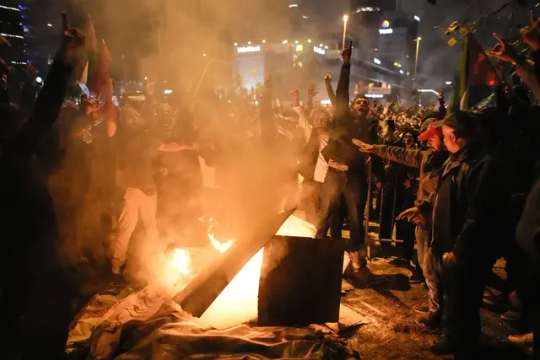
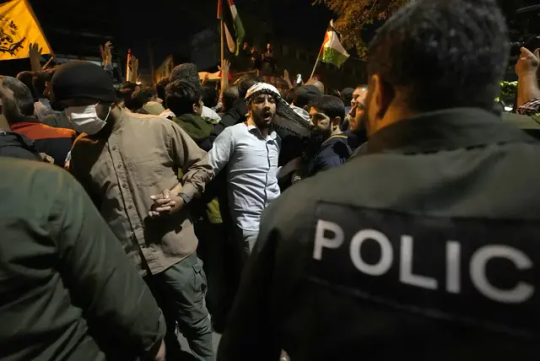





In Solidarity with Palestine
1. People shout slogans during a protest to show solidarity with Palestinians outside the Israeli consulate in Istanbul, Turkey | Emrah Gure
2. Some protesters try to stop other protesters not to attack the French Embassy in Tehran, Iran during an anti-Israel protest | Vahid Salemi
3. Demonstrators chant during a protest in solidarity with the Palestinian people in Gaza, at Martyrs' Square in downtown Beirut, Lebanon | Bilal Hussein.
4. A man poses with a Palestinian flag as people gather in Tahrir Square of Baghdad, Iraq to protest | Murtadha Al-Sudani.
5. People clash with anti riot policemen outside the Israeli consulate during a protest to show solidarity with Palestinians, in Istanbul, Turkey | Emrah Gurel.
6. Protesters clash with Lebanese security forces outside the U.S. Embassy during a demonstration in solidarity with the people of Gaza in Awkar, East of Beirut, after Israel's strike on Al-Ahli Baptist Hospital in Gaza | Joseph Eid
7. Protester demonstrates in front of the Israeli Consulate in Istanbul, Turkey after Israel's strike on Al-Ahli Baptist Hospital in Gaza | Ilker Eray
#palestine#free palestine#palestine you are not alone#ph#gaza#turkey#iran#iraq#lebanon#stop genocide#stop apartheid#decolonize palestine
944 notes
·
View notes
Text
by POTKIN AZARMEHR
‘Pro-Palestine’ protests have become a near-weekly occurrence across Britain. Since Hamas’s 7 October massacre, regular marches have been drawing in a growing number of young people, marked by passionate advocacy and fervent slogans. Yet despite their zeal, many of these protesters lack a fundamental understanding of the conflict they are so vociferously decrying.
In the past six months, I have attended many of these marches. Having engaged with numerous protesters, I have noticed a startling disconnect between their strong opinions on the Gaza conflict and their shaky grasp of basic facts about it. Among the most perplexing are the LGBT and feminist groups (the ‘Queers for Palestine’ types) who flirt with justifying Hamas’s atrocities. This is a bewildering alliance, given that Hamas’s Islamist ideology is clearly antithetical to the rights and values these groups claim to champion. Its reactionary agenda is profoundly hostile to women’s rights and LGBT individuals.
Protesters seem eager to make excuses for Hamas, but are conspicuously uninformed about exactly what or who this terrorist group represents. On 18 May, during a protest at Piccadilly Circus in London, I spoke to demonstrators who firmly believed that Hamas represents all Palestinians. When I questioned a well-educated participant about the last Palestinian election, she was unaware that none had occurred since 2006, when Hamas gained power in Gaza.
It wasn’t just young people who were uninformed. An older woman with an American accent, seemingly a veteran protester, admitted she knew that Hamas was linked to the Muslim Brotherhood, but had no deeper knowledge of its ideology or history. Others, such as members of revolutionary socialist groups, displayed similar gaps in understanding, unaware of critical events like the 1979 Iranian Revolution.
That revolution gave birth to the Islamic Republic of Iran, a theocratic regime that brutally oppresses its own citizens. It also sponsors Islamist groups like Hamas. I left Iran for the UK not long after that regime began and have spent years resisting its religious extremism and ruthless political intolerance. Protesters were not only unaware of these facts about the Iranian regime, but also ill-informed about the struggle against it, such as the ‘Woman, Life, Freedom’ protests against the government that began in 2022.
One particularly telling conversation involved a man advocating for a ‘Global Intifada’ to replace capitalism with socialism. When asked about successful socialist models, he was unfamiliar with the Israeli kibbutzim, one of history’s few successful egalitarian experiments. His ignorance of these communal settlements in Israel, built by socialist Jewish immigrants, was all too typical.
Perhaps the most telling moment was captured by commentator Konstantin Kisin earlier this year, when he encountered a young man holding a ‘Socialist Intifada’ placard. The protester admitted he had no idea what this meant and that he had taken the sign simply because it was handed to him.
Reflecting on past movements, such as the American anti-Vietnam War protests of the 1960s and the British Anti-Apartheid Movement of the 1980s, one can’t help but note a stark contrast. Protesters then were generally well-informed about their causes. Today’s pro-Palestine protests, however, seem to be driven more by unthinking fervour than by an understanding of the issues at hand.
Throughout all these protests, I am yet to encounter a single participant who condemns Hamas or carries a placard denouncing its terrorism. This not only undermines the protesters’ cause, but also risks aligning them with groups whose values fundamentally oppose the very rights and freedoms they claim to support. It appears that today’s young protesters are high on ideology, but woefully thin on facts.
Potkin Azarmehr is an Iranian activist and journalist who left Iran for the UK after the revolution of 1979.
305 notes
·
View notes
Text
ANTISEMITISM ON COLLEGE CAMPUSES EXPOSED
Committee on Education & the Workforce. U.S. House of Representatives
KEY FINDINGS
Key Finding: Students who established unlawful antisemitic encampments—which violated university polices and created unsafe and hostile learning environments—were given shocking concessions. Universities’ dereliction of leadership and failure to enforce their rules put students and personnel at risk. o Finding: Northwestern put radical anti-Israel faculty in charge of negotiations with the encampment. o Finding: Northwestern’s provost shockingly approved of a proposal to boycott Sabra hummus. o Finding: Northwestern entertained demands to hire an “anti-Zionist” rabbi and Northwestern President Michael Schill may have misled Congress in testimony regarding the matter. o Finding: Columbia’s leaders offered greater concessions to encampment organizers than they publicly acknowledged. o Finding: UCLA officials stood by and failed to act as the illegal encampment violated Jewish students’ civil rights and placed campus at risk.
Key Finding: So-called university leaders intentionally declined to express support for campus Jewish communities. Instead of explicitly condemning antisemitic harassment, universities equivocated out of concern of offending antisemitic students and faculty who rallied in support of foreign terrorist organizations. o Finding: Harvard leaders’ failure to condemn Hamas’ attack in their widely criticized October 9 statement was an intentional decision. o Finding: Harvard President Claudine Gay and then-Provost Alan Garber asked Harvard Corporation Senior Fellow Penny Pritzker not to label the slogan “from the river to the sea” antisemitic, with Gay fearing doing so would create expectations Harvard would have to impose discipline. o Finding: The Columbia administration failed to correct false narratives of a “chemical attack” that were used to vilify Jewish students, but imposed disproportionate discipline on the Jewish students involved.
Key Finding: Universities utterly failed to impose meaningful discipline for antisemitic behavior that violated school rules and the law. In some cases, radical faculty successfully thwarted meaningful discipline. o Finding: Universities failed to enforce their rules and hold students accountable for antisemitic conduct violations. o Finding: Columbia’s University Senate obstructed plans to discipline students involved in the takeover of Hamilton Hall. o Finding: Harvard’s faculty intervened to prevent meaningful discipline toward antisemitic conduct violations on numerous occasions. o Finding: Harvard Corporation Senior Fellow Penny Pritzker acknowledged that the university’s disciplinary boards’ enforcement of the rules is “uneven” and called this “unacceptable.”
Key Finding: So-called university leaders expressed hostility to congressional oversight and criticism of their record. The antisemitism engulfing campuses was treated as a public-relations issue and not a serious problem demanding action. o Finding: Harvard president Claudine Gay disparaged Rep. Elise Stefanik’s character to the university’s Board of Overseers. o Finding: Columbia’s leaders expressed contempt for congressional oversight of campus antisemitism. o Finding: Penn’s leaders suggested politicians calling for President Magill’s resignation were “easily purchased” and sought to orchestrate negative media coverage of Members of Congress who scrutinized the University
#antisemitism on college campuses exposed#antisemitism#college campuses#jewish students#harvard university#claudine gay#columbia university#congressional oversight#campus antisemitism
113 notes
·
View notes
Note
I’m a bad person so I’m not even going to pretend or sugarcoat my words
Antisemitic students facing the consequences of their actions mean NOTHING to me
I’m not even going to fake a little “aw that’s such a human rights violation” because 1) the human rights violation didn’t actually start, nobody was deported yet for protests and 2) the human rights violation started when they didn’t allow Jews to go to class
A lot of you are privileged enough not to know
But some of us do
I’m poor
I have to face the consequences of my actions everyday (and more) because of poverty
This is life
For culture day, Israelis can’t wear their flag like everyone else
We aren’t like other people
We can’t pretend anymore for the sake of living and surviving
The atmosphere of Universities have been dull and bleak since October 7th
But now that gentiles are reaping what they sowed, suddenly injustice matters again
I’m not saying “an eye for an eye”
I’m saying “you made your bed so lay in it”
We all make our own choices
A lot of Jews chose to wear their Magen Davids which they were intimidated into not wearing every single day. That choice results in antisemitism and we accept that and deal with it. It means losing friends, job restriction, being at risk of assault everyday, etc.
Some Jews chose their comfort and safety and sided with Hamasniks who used their bodies to block Jewish students from going to class. It makes them look like a “good person” (the definition of good means supporting and enabling the harassment of Jews now) and they get to laud themselves an anti genocide hero. Unfortunately another result of that decision means having your face be eaten later on.
Grants being cut is a deadly blow that has a lot of people scared and scrambling
Antisemites who have been hiding their face, who have been terrorizing Jewish students and the few who stand with us, who have made the environment completely unlivable for Jews, are now in the process of being deported
They never thought the day would come where they would face any sort of consequence
They thought they could just continue to scream at Jews, call us slurs, call us every bad word in the book, vandalize the homes of Jewish professors and employees, storm events and make it about Palestine, throw red paint everywhere, rip down hostage posters, write antisemitic slogans everywhere, all that jazz (and this is just the tip of the iceberg) because they hadn’t faced any backlash for hating Jews, instead they were encouraged and empowered for doing so
Now they are finally tasting it
Now they’re scared
.1% of what we’ve been enduring and maybe less
I don’t care
I can’t care for everyone
I cannot care for someone who calls for my death and I refuse to
And get this
Antisemites being deported by right wingers isn’t a measure of good or bad
It’s the first time antisemites have realized they aren’t protected from their actions
That their antisemitism comes with a cost
Our fates are intertwined with right wingers not just because we were abandoned by the Left and Center
But also because this flavor of antisemitism comes with anti Americanism right next to it
Of course right wingers won’t let it slide
These protests aren’t just filled with support for Jew hating, extremist groups
The slogan goes “Death to Israel, Death to America”
That’s why we are going to see some sort of justice for ourselves
You don’t have to like it but it’s going to happen and even though the atmosphere for Jews will be worse, most of us don’t give a fuck
They hate us what’s new?
Maybe Jews can go to class now and not have to sit in a room full of people who get to taunt us and mock us and call for our deaths as a glorified hobby, who ruin our reputations by labeling us as ZioNazis, who go out of their way to poke at us and get a reaction to make us look bad
Sorry this doesn’t come clean but it’s here and it will help
.
54 notes
·
View notes
Text
the problem with the slogan “nobody is illegal on stolen land” is that it leaves the door wide open for all the same dehumanizing rhetoric & violence to continue to be used against migrants & refugees as long as you believe the land is yours by right
this is not theoretical. it is exactly the logic used within the Pro-Palestine movement to paint Jewish refugees who fled pogroms & the Holocaust to Mandatory Palestine as invaders & colonizers because they entered the land “illegally”, to justify the Arab Revolt & other acts of anti-Jewish violence by Palestinians, to demand Jews leave the land, & paint any attempt by Israel to secure its border as inherently racist, all under the banner of “nobody is illegal on stolen land”
indigineity is a non-factor in the morality & legality of mistreating migrants & refugees. the wrongness of violence against foreigners, draconic border policies, and mass deportations stands on its own; it is not dependent on whether the land is stolen or not.
if you’re trying to say “nobody should be illegal” you can just say that. it’s less wordy & harder for blood-and-soil nationalists to co-opt.
167 notes
·
View notes
Text
I bet the last thing Bernie Sanders expected upon his arrival in Ireland and Britain was to be met by angry protesters—to find himself heckled and damned as a sellout by the kind of radicals who would have been shouting his praises just six months ago. And yet that is what happened: Some of Britain's Bernie Bros have morphed into Bernie bashers.
Why? Because he refuses to describe Israel's war on Hamas as a "genocide" and he doesn't approve of the boycott, divestment, and sanctions movement against Israel.
Quick—cast him out. Unperson him. He has ventured outside the parameters of acceptable Left-wing thought and must be punished.
It all kicked off in Dublin. Senator Sanders, who is on these isles to promote his book, Why It's OK To Be Angry About Capitalism, was speaking at University College Dublin. A group of pro-Palestine protesters assembled at the entrance to the venue, all wearing the uniform of the virtuous: a keffiyeh. "It's OK to be angry about capitalism, what about Zionism?" they chanted.
It got heated inside, too. Sanders was interrupted by audience members. "Resistance is an obligation in the face of occupation!" one shouted. "Occupation is terrorism!" yelled another.
Sanders kept his cool with his reply: "Good slogan, but slogans are not solutions," he said.
It continued at Trinity College the next day. Sanders was in conversation with the Irish journalist Fintan O'Toole. Outside, a small but noisy gaggle of anti-Israel agitators displayed a banner that said: "Boycott Apartheid Israel."
"Free Palestine!" they chanted. (Deliciously, a woman who was queuing for the Sanders event bellowed "from Hamas!" every time they said it.)
Again, Sanders was heckled by hotheads. "Ceasefire now!" they shouted. At one point, in the words of Trinity News, Sanders "threw up his right arm in frustration and looked at O'Toole, as if to ask him what would be done."
It is little wonder he felt frustrated. Sanders was there to talk about capitalism, yet angry youths kept badgering him about Zionism. He is used to a fawning response from Socialist twentysomethings, and yet now some were effectively accusing him of being complicit in a "genocide." It's quite the downfall for one of the West's best-known leftists.
The turn on Bernie is underpinned by a belief that he is too soft on Israel. The radical Left will never forgive him for initially supporting Israel's war on Hamas. Even his more recent position—he now says there should be a ceasefire—is not good enough for these people, who seem to measure an individual's moral worth by how much he hates the Jewish State.
They want Bernie to say the G-word. They want him to damn Israel as uniquely barbarous. They want him to agree with them that it is right and proper to single Israel out for boycotts and sanctions.
In short, they want him to fall into line. They want him to bend the knee to their Israelophobic ideology.
These illiberal demands on Bernie to bow down to correct-think continued when he arrived in the U.K. A group of communists protested against him in Liverpool. Normally, Sanders would have been shown only love in a historically radical city like Liverpool, said the Liverpool Echo, but this time, "the atmosphere was different," for one simple reason: "his refusal to brand Israel's actions in Gaza as 'genocide'."
Sanders' resistance of the G-word haunted him in his media interviews, too. Ash Sarkar of Novara Media, a key outlet of Britain's bourgeois Left, asked him three times if he would call Israel's war on Hamas a "genocide." He refused and it went viral. Armies of ersrtwhile Bernie fans damned him as a "genocide denier."
There is something quite nauseating in this spectacle of an elderly Jewish man being pressured to denounce the world's only Jewish State as genocidal. Millennial Gentiles who want to trend online might be happy to throw around the G-word. But Senator Sanders, who lost family in the Holocaust, clearly has a deeper moral and historical understanding of what genocide is. And it seems he is not willing to sacrifice that understanding at the altar of retweets or an easy ride.
Good for him.
Sanders' father was born in Poland, where most of his family were exterminated by the Nazis. Sanders is a son of the Shoah, a descendant of survivors of the greatest crime in history. To subject him to the modern equivalent of a showtrial in which you demand that he scream "Genocide!" at Israel feels unconscionable. As does branding him a "genocide denier."
Why won't he call Israel's war on Hamas a "genocide"? Maybe, says a writer for the Jewish Chronicle, it's because he lost so much of his family to Hitler's gas chambers and therefore he "knows what a genocide is, what a war crime is." He knows that while the war in Gaza, a war started by Hamas, is "horrible," to use his word, it cannot in any way be compared to the Nazis' conscious efforts to vaporize an entire ethnic group.
There has been a Inquisition vibe to some of the Bernie-bashing in Britain. At times it has felt cruel. The sight of fashionable, privileged Israel-bashers haranguing a man who will have heard stories from his own father about the genocidal mania of the Nazis has come across like Jew-taunting rather than political critique.
More broadly, this unseemly episode gives us a glimpse into the authoritarian impulses behind the Left's obsessive opposition to Israel. Israelophobia, it seems, is less a rational political stance than a borderline religious conviction. There are true believers, who dutifully repeat the G-word like a mantra, and sinful outliers, who refuse to treat Israel as uniquely "problematic."
One's moral fitness for radical society is increasingly judged by one's willingness to treat Israel as the most wicked nation in existence. The dangers of making hostility to the Jewish State a requirement of being a Good Leftist should be clear to everyone.
Sanders is wise to resist this tyrannical zeitgeist, and to say what he believes rather than what he believes will be popular.
Brendan O'Neill is the chief political writer of spiked. His new book, A Heretic's Manifesto: Essays on the Unsayable, is available now.
The views expressed in this article are the writer's own.
336 notes
·
View notes